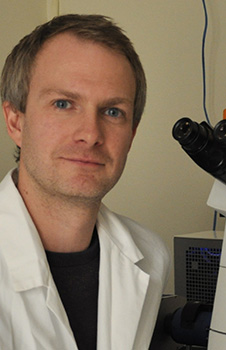Monday 23 November 2020 11:56am

Associate Professor Pete Jones.
Should you follow your heart or follow your head? In the case of Associate Professor Pete Jones, studying the heart has led him to the brain! With funding from the Neurological Foundation and the Health Research Council, Pete will examine what role a protein called the ryanodine receptor plays in the brain.
In the heart, the ryanodine receptor releases calcium which triggers the heart to contract. However, if the receptor carries a mutation, modified due to cellular stress, or incorrectly arranged, the calcium release is not controlled correctly, leading to arrhythmia or even heart failure. So how do we get to the brain?
Correct calcium release is also crucial for neuronal communication. The ryanodine receptor is linked to seizures, and more recently, to neurodegenerative diseases like Alzheimer's Disease. Perhaps the same mutations or incorrect arrangements of the ryanodine receptor lead to problems in the brain? Pete has 20 years of experience in studying the receptor, but he had to assemble a team to ask these questions in the brain. The exciting team includes Professors Cliff Abraham, Ruth Empson, and Drs Laura Gumy and Shane Ohline.
Together this team will study the receptor in mouse models of Alzheimer's disease, as well as in patient samples from the New Zealand Brain Bank. Pete says “there's still a lot I have to learn about the brain, but it looks like this receptor works the same way in the brain as it does in the heart.”
Pete's work could bring a new understanding of what goes wrong in Alzheimer's disease. Importantly, Pete and his team will test if existing drugs that target ryanodine receptors in the heart could be re-purposed for the brain. Ultimately, targeting this receptor could even be beneficial for other brain disorders, such as epilepsy.
Find an Otago expert
Use our Media Expertise Database to find an Otago researcher for media comment.
